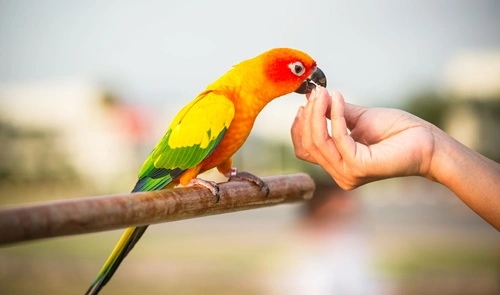No, keeping native Indian parrots as pets is not legal in India. The Wildlife Protection Act, 1972 prohibits the capture, trade, and keeping of birds native to India, including parrots such as the Indian Ringneck Parrot, Alexandrine Parrot, and Rose-Ringed Parrot. However, exotic parrot species that are not native to India can be legally kept as pets, provided they comply with customs and wildlife regulations.
Legal Framework Governing Parrots in India

- Wildlife Protection Act, 1972
- Under this Act, native Indian bird species are protected.
- It is illegal to:
- Capture, trade, or sell native parrots.
- Keep native parrots as pets without permission.
- Penalties for violating the Act include imprisonment of up to 7 years and a fine of up to ₹25,000.
- CITES (Convention on International Trade in Endangered Species of Wild Fauna and Flora)
- India is a signatory to CITES, which regulates the trade of exotic birds, including parrots.
- Exotic species not listed under the Wildlife Protection Act but covered by CITES require proper documentation for import and possession.
- Prevention of Cruelty to Animals Act, 1960
- This Act ensures that birds kept in captivity are not subjected to cruelty. Improper care, small cages, or neglect can lead to penalties.
Native Parrot Species Protected by Law
The following parrot species, commonly found in India, are protected under the Wildlife Protection Act:
- Indian Ringneck Parrot (Psittacula krameri)
- Alexandrine Parrot (Psittacula eupatria)
- Plum-Headed Parrot (Psittacula cyanocephala)
- Red-Breasted Parrot (Psittacula alexandri)
Keeping any of these parrots as pets is illegal, as they are considered part of India’s natural wildlife heritage.
Exotic Parrot Species and Legal Ownership
- Legality of Keeping Exotic Parrots
- Exotic parrot species that are not native to India, such as African Grey Parrots, Cockatoos, and Macaws, can be legally kept as pets.
- However, the owner must comply with the guidelines set by the Directorate General of Foreign Trade (DGFT) and Customs Department.
- Registration of Exotic Birds
- In 2020, the Indian government mandated the voluntary declaration of exotic pets, including parrots. Owners must register their exotic birds on the Parivesh Portal, a platform managed by the Ministry of Environment, Forest, and Climate Change.
- Documentation Required
- Proof of purchase from a licensed breeder or importer.
- Import documents, if applicable.
- Registration certificate from the Parivesh Portal.
Penalties for Keeping Native Parrots
- Imprisonment: Up to 7 years.
- Fines: Up to ₹25,000.
- Seizure: Native parrots kept illegally can be confiscated by the Forest Department or wildlife officials.
Ethical and Practical Concerns
- Impact on Wildlife
- Capturing parrots from the wild disrupts ecosystems and threatens biodiversity. Many native parrots face population decline due to illegal pet trade.
- Health and Welfare
- Parrots are social, intelligent birds requiring proper care, large spaces, and mental stimulation. Improper care in captivity can lead to stress and health issues.
- Awareness and Advocacy
- Many people are unaware of the laws protecting native birds. Wildlife organizations are actively working to educate the public and prevent illegal ownership.
How to Ensure Compliance with Laws
- Identify the Species
- Verify whether the parrot you wish to keep is native or exotic. Consult wildlife experts or authorities if unsure.
- Register Exotic Parrots
- Declare exotic parrots on the Parivesh Portal and maintain proper documentation to prove legal ownership.
- Avoid Buying Native Parrots
- Do not purchase native parrots from unlicensed breeders or markets. Report illegal wildlife trade to authorities.
Conclusion
While keeping exotic parrot species is legal in India, owning native parrots is a violation of the Wildlife Protection Act, 1972. To ensure compliance with the law and protect India’s rich biodiversity, individuals must refrain from purchasing or keeping native parrots as pets. Instead, adopting exotic species responsibly and ensuring their proper care can allow bird enthusiasts to enjoy pet ownership within the legal framework. Always prioritize ethical practices and contribute to wildlife conservation.
Hina Abbasi is Editor and a passionate sports and entertainment content writer at WinnersMaze.com. Hina’s expertise spans across a wide range of sports, and interest in many TV shows allowing her to deliver insightful analysis and compelling stories that resonate with readers.

